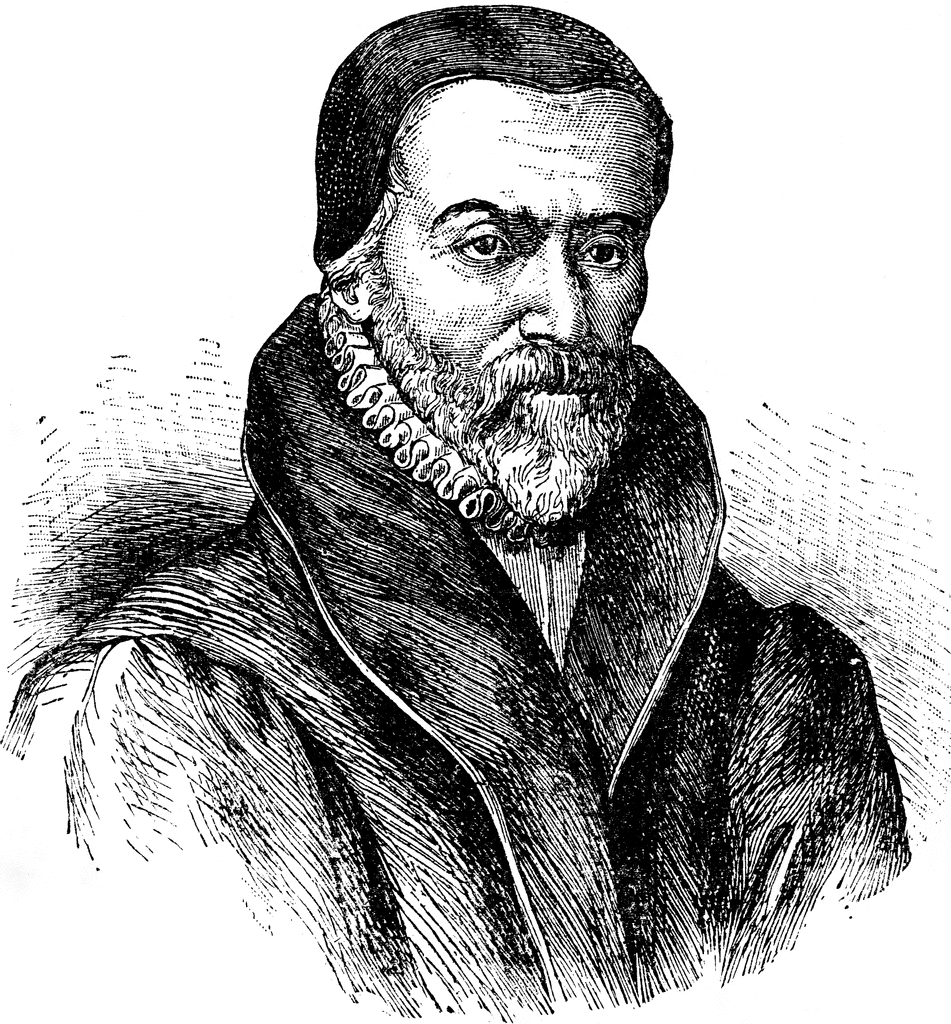
Visiting the KJV exhibit at the library (you can read about my experience
here)really sparked my interest in the history and background of the printed bible. I had seen articles about a documentary about the coming forth of the King James Version Bible in the Daily Universe that would be on BYU TV, so I thought I would watch it. The second part of the three part series deals a lot with how vital printing was to the spread of the Bible to the masses, especially as it was translated into the vernaculars. There was some really interesting things I learned that I never knew or had even thought of before...
 |
| William Tyndale |
The documentary started off noting that it was condemned in most Western European countries to translate the Bible into a vernacular language. In fact, a document in 1408 called the Constitutions of Oxford made it illegal to translate the Bible into English. Over a century later in 1523,William Tyndale asked for permission from the English Church to translate it into English, but was denied. Because of this, he went to Germany and began a secret translation of the Bible into English, the first one translated into English from the original Greek and Hebrew scripts. Once in Germany, it took him under two years to finish the translation of the New Testament and begin having it printed, thanks to the invention of the printing press about a century earlier. The documentary mentioned that at the time of the invention of the press, Gutenburg printed only about 200 books in his first production. Only two generations later, Martin Luther could print a pamphlet and sell over 250,000 copies within one year. That shows just how rapidly printing spread and how much more accesible it made reading to the masses when compared to writing. Something also mentioned I thought was interesting was that early printers were not only trying to make money by printing what the people wanted, the Bible and other religious texts, but they were also genuinely trying to be "Godly" and were printing with the idea that they were doing God's work. I doubt that can be said of many modern printers.
Tyndale's printed Bible's were smuggled into England in, among other things, barrels of grain. The documentary compared the reaction of British authorities then to how modern customs authorities would respond to drugs being smuggled across the border. The English Church officials saw what effect a vernacular Bible was having in the Reformations in countries like Germany and Switzerland and knew that something so wicked would of course corrupt the church, so naturally they burned every English Bible they could get their hands on. It makes me grateful to be a part of a church where personal scripture study is encouraged, rather than outlawed. Obviously, the printing press allowed for a much greater volume of Bibles to be printed than could ever be hand written, and this did two things. It drove up the market for English Bibles, and it made them affordable to the common man. (This seems to be an instance where increasing supply also increased demand.)
 |
| The Great Bible |
 |
| King Henry VIII |
Tyndale was executed for heresy in 1536 by "strangulation", then his dead body was burned (???). Interestingly enough, due to so much pressure and demand for the English Bible, King Henry the VIII (who, as the documentary noted, was greatly influenced by Tyndale's book, "The Obedience of a Christian Man", which argued every man should have access to the bible and live by it's precepts rather than the Church's) authorized a printing of the Bible (known as the Great Bible), which was about 80% Tyndale's translation (some "questionable" phrases were removed"). It is thanks to martyrs like Tyndale that we have the restored gospel today, for without him a 14 year old farm boy couldn't have personal access to the New Testament. I would recommend this documentary to everyone; here's the link:
http://byutv.org/show/123d4a82-3d47-488e-beda-2496a5a1ff2c .
 Visiting the KJV exhibit at the library (you can read about my experience here)really sparked my interest in the history and background of the printed bible. I had seen articles about a documentary about the coming forth of the King James Version Bible in the Daily Universe that would be on BYU TV, so I thought I would watch it. The second part of the three part series deals a lot with how vital printing was to the spread of the Bible to the masses, especially as it was translated into the vernaculars. There was some really interesting things I learned that I never knew or had even thought of before...
Visiting the KJV exhibit at the library (you can read about my experience here)really sparked my interest in the history and background of the printed bible. I had seen articles about a documentary about the coming forth of the King James Version Bible in the Daily Universe that would be on BYU TV, so I thought I would watch it. The second part of the three part series deals a lot with how vital printing was to the spread of the Bible to the masses, especially as it was translated into the vernaculars. There was some really interesting things I learned that I never knew or had even thought of before...


I would assume that King Henry knew that Tyndale was being executed for his crime, right? Why did he agree with him, his idea, and his book, and still allow him to be executed? Do you know if he read "The Obedience of a Christian Man" after Tyndale's death?
ReplyDelete